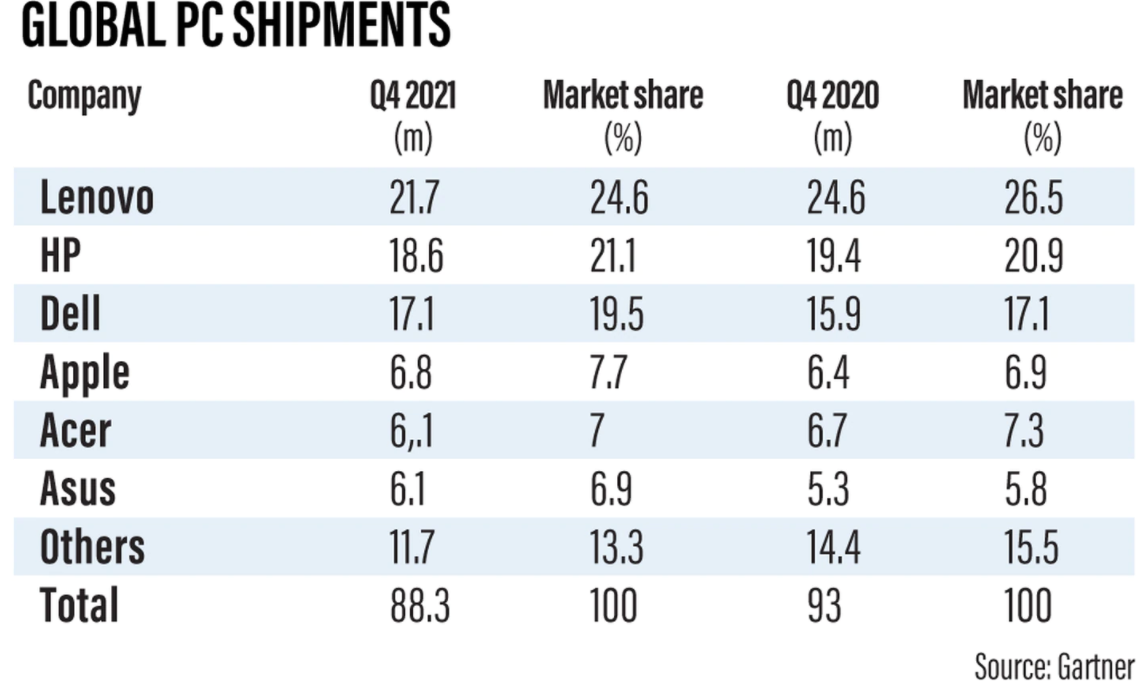Global shipments of personal computers dropped by almost 5 per cent annually in the fourth quarter of last year, marking an end to a sales boom for these devices that was prompted by the Covid-19 pandemic. Worldwide PC sales exceeded 88.3 million units in the October-December period, about 4.6 million fewer than in the same period of 2020, according to a new report by Gartner, a Connecticut-based researcher. “A sharp decline in the US PC market, caused by ongoing supply chain issues and the collapse in demand for Chromebooks, drove this quarter’s slowdown,” Mikako Kitagawa, Gartner’s research director, said. 
“This likely signifies the end of the massive and unexpected growth in PC demand triggered by the pandemic,” Ms Kitagawa said. Last quarter’s dip was the first yearly decline after six consecutive quarters of growth. In the previous quarters, vendors reported an increase in sales as more businesses and educational institutions switched to remote operations. But the fourth quarter’s decline only slightly tempered the PC market’s growth last year, which registered the highest shipment volume since 2013. PC shipments rose almost 10 per cent annually to 339.8 million units in 2021. “During the pandemic, shipment growth has been supported by an average selling price hike, resulting in higher revenues and a healthier market overall … annual PC shipment volumes are not expected to decline to pre-pandemic levels for at least two to three years,” Ms Kitagawa said. Despite its sales falling 12 per cent in the fourth quarter, Lenovo still led the market with a 24.6 per cent market share. The Chinese tech company sold more than 21 million units, about 2.9 million fewer than in the last three months of 2020. It was the first period of annual decline for the company since the first quarter of 2020. The drop was due to the slowed US market, weak Chromebook demand and supply chain problems, which impeded Lenovo’s ability to supply PCs to enterprise customers, Gartner said. California-based manufacturer HP, whose sales dropped nearly 4.2 per cent, occupied the second spot with a 21.1 per cent market share in the last quarter. It sold more than 18.6 million units during the period. Another US PC-maker, Dell, gained market share this period after notching its fifth consecutive quarter of growth. Its shipment volume exceeded 17.1 million PCs for the first time in the company’s history, led by strong performance in Latin America, Asia Pacific, and Europe, Middle East and Africa, according to Gartner. Dell occupied 19.5 per cent of the global market share. In the Europe, Middle East and Africa region, PC shipments grew 7.4 per cent year-on-year to total 26 million units, the highest volume in five years. The growth was led by business PC demand associated with increasing economic and social recovery, as many businesses, schools and universities began to return to in-person operations, the report said. Excluding Japan, the Asia-Pacific market grew by 11.5 per cent, year on year. The US PC market had its second consecutive quarter of double-digit decline during the fourth quarter of last year, with shipments falling by 24.2 per cent annually. Gartner expects PC demand to slow for at least the next two years, but annual shipment volumes are not predicted to decline to pre-pandemic levels in that period. “The pandemic significantly changed business and consumer PC user behaviour, as people had to adopt to new ways of working and living,” Ms Kitagawa said. “Post-pandemic, some of the newly established ways of using PCs will remain regular practice, such as remote or hybrid workstyles, taking online courses and communicating with friends and family online.”
|